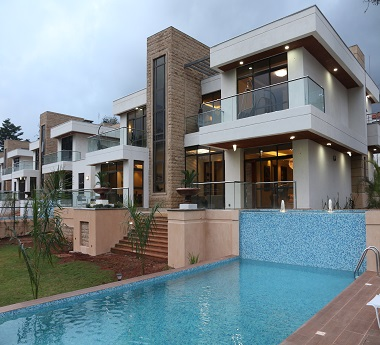A step away from the bustling city slums, Nairobi’s leafy suburbs like Karen and Runda fetch huge prices, a testament to a luxury Real Estate boom fueled by Kenya’s dollar millionaires. With the Real Estate sector contributing 10.8% to GDP in Q3 2024, slightly increasing from 10.5% in Q3 2023 according to the Kenya National Bureau of Statistics, Nairobi’s Real Estate market seems thriving, even as the broader economy grapples with a 4.0% GDP growth in Q3 2024, down from 6.0% in Q3 2023. So, one can only ask why are millionaires pushing property prices out of reach for most in 2025.
Real Estate, making up 10.5% of Kenya’s GDP in Q3 2024 up from 10.3% in 2023, as per the Kenya National Bureau of Statistics report, is a bright spot despite a sluggish 4.0% GDP growth in Q3 2024, compared to 6.0% the year before. Knight Frank’s 2025 Wealth Report states that Nairobi has more than 3,000-dollar millionaires pouring cash into high-end homes leading to a surge in luxury demand, with investors eyeing 10.0% to 11.0% gross yields in prime neighborhoods like Kileleshwa and Westlands.
Unlike equities, Real Estate offers the much-needed stability. In 2023, 60.0% of Kenya’s high net-worth individuals planned to invest in private rental properties, a trend continuing into 2025 as per the Knight Frank’s report. Diaspora remittances, are closely linked with this boom, with overseas Kenyans snapping up high end homes in the city. This was as per Central banks report which stated that slightly half of the remittances are used in real estate; Land and building
The Central Bank of Kenya stated that the formal financial inclusion stood at 84.0% in 2024, yet only 3.6% of Kenyans accessed mortgages, underscoring cash driven luxury purchases. The Kenya Bankers Association Housing Price Index report townhouses averaging KES 38.63 million in Q3’2024, with luxury prices resilient despite a 14.28% year-on-year housing price drop
However, Nairobi’s booming property market has a dark side. Speculations around illicit funds from Somalia that led to Kenya being Grey listed by the Financial Action Task Force in early 2024 on claims for money laundering, is inflating prices and pushing locals out of the market. The property value increase in 2024 has severely impacted middleclass affordability, favoring only the wealthy cash buyers.
For investors, purchasing the high-end properties, the allure is clear, the rental yield and capital appreciation which stands at 7.5% and 2.7% 0n average respectively. Yet, as Nairobi’s sky grows, the luxury boom risks widening inequality and balancing this surge with affordable housing remains Kenya’s 2025 challenge

















